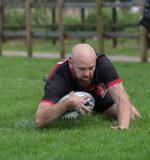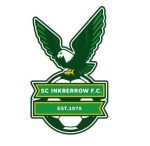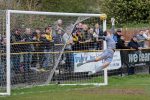IN A special feature, LEWIS COX chats to club secretary Dave Jones about the past, present and future of Redditch United:
REDDITCH United are a club in transition, both on and off the field.
Chairman Chris Swan wants to move the Reds to a new ground, or create modern facilities at The Valley Stadium including a 3G playing surface to push on to the next level.
On the pitch, they are on the up too. Under a young, fresh boss with modern ideas in former player Liam McDonald, the Southern Premier side has shown it is on track to challenge for promotion to the Conference North or South.
But, having the right location and running the club sustainably will be vital elements to ensure the Reds can aim high, according to club secretary Dave Jones.
“A club of our size needs either robust, strategic management to keep it at the level you’re at or it needs a financial investment,” Jones tells me. “It’s either/or.”
It was in March 2011 that successful entrepreneur Swan took the reins of a historic club that had suffered much financial turmoil over the previous few seasons and had seen their football fortunes slide as well.
“The three or four people that were in charge before couldn’t provide the club with the financial investment and it turned out they weren’t able to manage it and sustain it as it was,” said Jones.
Swan, who had previously been linked with a takeover at Kidderminster Harriers, took control of the club and in the words of the current secretary ‘saved it from going under’.
The debt that Swan, along with wife Sallie, had taken over was discovered to exceed six figures – an amount that startled the club’s loyal support.
When Chris took over it was haemorrhaging money, it was far past the ‘sticky-plaster’ stage,” said Jones, who was appointed secretary soon after Swan took over.
“Originally I was part of a supporters’ club before the takeover. There were a few of us discussing how to keep the club going the best we could and Chris threw the life-ring out to save us.
“Fortunately, we are at a more ‘sticky-plaster’ stage now, rather than haemorrhaging money, that’s thanks to Chris.”
In a recent statement, Swan said the Reds have been ‘fairly easily able in the last four years to redress the community perception and build a debt-free club we can all be proud of’.
Frustration
But the chairman has also spoken of his frustration. A proposed move to nearby Washford, with plans for a new stadium with a 3G surface and five grass pitches, were rejected in 2013.
Swan is now looking at a 3G pitch replacing the Valley Stadium surface, costing £750,000, with FA funding, private funding, other grants and funding from himself, but the the District Valuer states the club would have to pay five times its current rental agreement, which is another headache.
“I think the relocation didn’t come off because of various reasons with the valuing of the two plots of land and the provision of affordable housing,” said Jones.
“Chris is now looking at the 3G on the full pitch, I’m not sure where that is at this exact moment, I’m aware of prices and that he’s speaking with the council over approval and an increase in the lease and tenancy agreement on the football club to cover his investment.
“3G surface would bring in additional income through rental that would filter back to the playing budget, plus you’d have more people to see the facilities and taking out more bookings for parties.
“With a little bit of capital expenditure, a stroke of good luck and backing by the council, I think we can become more than sustainable.”
For now, as with many clubs at their level, they need to ensure they have more income than expenditure. Just look at the clubs who are no more, including Hereford United who sadly fell by the wayside last year. Non-League football finances are generally in a parlous state so every penny counts.
Jones, an accountant, explained: “Our main three sources of income are turnstiles, what we get through advertising and our revenue from the bar.
“We’re not a leisure centre, a pub or bar, we’re not open seven days a week, but fortunately we have our junior sides and when they’re playing it provides a great chance to get the bar open, so in that instance the youth sides are vital to us.
“The advertising income for clubs like us is massive. The partnership we have with Cruise (a cruise-liner holiday destination company) has been magnificent and long may that continue.
“It is difficult to compete with the papers and other commercial companies on that basis. We’ve been reaching an average gate of 270/280 this season, so it remains difficult to persuade the companies we are a worthwhile gamble.”
We speak about the state of the current Non-League game, and Jones believes the money-men at the top should help others down the football pyramid.
“I think that not enough is done by the FA to filter down small pools of money from the very top boys into grassroots football,” said Jones.
“Very soon, they will just price themselves out at top-level football and people will just drop away.
“Teams are going bust every season. When I was a kid in the 1980s, when a team was in trouble it was major news – now a team goes bust every season.
“And that comes from over-spending and not managing their finances correctly.”
Ironic, really, that Jones was speaking about clubs suffering from the same fate that almost befell Redditch United. Hereford’s demise was an example of splashing the cash, and paying the consequences.
Silly money
“If Hereford were going to throw silly money at their players, with a crowd of 500 people, it wasn’t sustainable,” said Jones.
“Somebody was going to have to fund it from somewhere.
“As a supporter, I wouldn’t like Chris to throw huge amounts of money at the football club, because if you start to raise the wage bill astronomically, and Chris got fed up, or had to leave – you’d go under.
“It’s a very similar situation to at Kidderminster Harriers now. After having lost their best players because they couldn’t afford to pay them, their results will dwindle, attendances will drop and soon they’ll be down there fighting.
“Redditch United, very similar to Kidderminster Harriers, are private companies, they’re not public companies. It’s not like over at the town hall where the figures are out there for us to see.”
Just like the town hall, however, there are politics involved.
Swan has revealed his ambition for the club on numerous occasions, but his endeavours have been stalled at many levels.
And indeed Jones explains he was very much taken aback by the political toing and froing.
“It’s certainly a lot more political than I anticipated when I had taken the role on,” he said.
“I don’t work for the council, but they seek my advice for audit (outside of the United role) and I haven’t found personally there are many barriers there – but yes it is certainly very politically-charged – as I’m sure most, if not all, football clubs are.”
Thankfully, matters on the pitch have been considerably smoother.
Working relationship
Intrigued as to how Jones works with the first team manager, he tells me a strong working relationship is key.
“Each season we sit down and sort out a fairly robust forecast for the coming year,” said Jones. “It includes what Liam would have budgeted for players, winter training, what we pay on seed, ground and stadium maintenance. It’s all worked out, down to things like laundry costs.
“It’s set out in stone and we monitor it every month, keeping track of whether we’re up one month or down in another.
“The first year when Chris had taken over it was a bit ‘pie-in-the-sky’ for us, for want of a better phrase, because there were no statistics to go by.”
So, Redditch United seem in safe enough hands sustainability-wise – but what about the next step?
“If we got promoted, there would obviously be additional expenses,” said Jones. “But I also know there would be similar conversations regarding how we would manage it, compared to what extra revenue we’d bring through the gates and how away travel could change.
“I couldn’t see it being much more than this season’s away travel, though! We’ve had 23 away games and we’ve had 20 coaches booked (for player/squad travel), that means we’ve had three away games at less than 100 miles – such are our geographical issues.
“We have a great relationship with Dudley Coaches. Without that, we could be spending a lot more than £15,000-per-season on coach travel and we’re very thankful.
“We get a letter each year saying we may be subject to league change, but we take that with a pinch of salt .
“Every bit we’d save if we were moved geographically would filter back into the playing budget. The club’s not here to make money, it is to be sustainable.”
Manager Liam McDonald has overseen a remarkable turnaround in fortunes on the pitch at the Valley Stadium.
George Carline has been a revelation for United this season.









